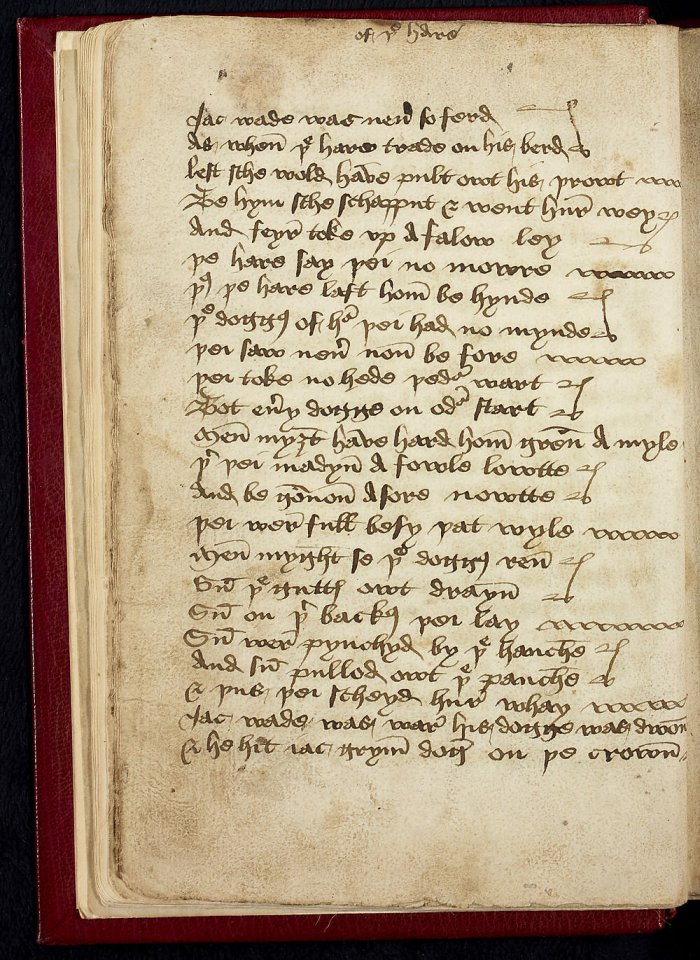Unique 15th-Century ‘Bawdy Bard’ Act Sheds New Light On British Comedy
Jan Bartek - AncientPages.com - An unprecedented record of medieval live comedy performance has been identified in a 15th-century manuscript. Raucous texts—mocking kings, priests and peasants; encouraging audiences to get drunk; and shocking them with slapstick—shed new light on Britain's famous sense of humor and the role played by minstrels in medieval society.
Scribe's note ‘By me, Richard Heege, because I was at that feast and did not have a drink’, in the Heege Manuscript (bottom of p.60 verso). This caught the attention of Cambridge researcher Dr James Wade. Credit: National Library of Scotland
The texts contain the earliest recorded use of "red herring" in English, extremely rare forms of medieval literature, as well as a killer rabbit worthy of Monty Python. The discovery changes the way we should think about English comic culture between Chaucer and Shakespeare.
Throughout the Middle Ages, minstrels traveled between fairs, taverns and baronial halls to entertain people with songs and stories. Fictional minstrels are common in medieval literature but references to real-life performers are rare and fleeting. We have first names, payments, instruments played and occasionally locations, but until now virtually no evidence of their lives or work.
Dr. James Wade, from Cambridge University's English Faculty and Girton College, came across the texts by accident while researching in the National Library of Scotland. He then had a "moment of epiphany" when he noticed the scribe had written: "By me, Richard Heege, because I was at that feast and did not have a drink."
"It was an intriguing display of humor and it's rare for medieval scribes to share that much of their character," Wade says. That made him investigate how, where and why Heege had copied out the texts.
Wade's study, published today in The Review of English Studies, focuses on the first of nine miscellaneous booklets in the "Heege Manuscript". This booklet contains three texts and Wade concludes that around 1480 Heege copied them from a now lost memory-aid written by an unknown minstrel performing near the Derbyshire-Nottinghamshire border.
The three texts comprise a tail-rhyme burlesque romance entitled "The Hunting of the Hare," a mock sermon in prose, and "The Battle of Brackonwet," an alliterative nonsense verse.
"Most medieval poetry, song and storytelling has been lost," Wade says. "Manuscripts often preserve relics of high art. This is something else. It's mad and offensive, but just as valuable. Stand-up comedy has always involved taking risks and these texts are risky! They poke fun at everyone, high and low."
Part of 'The Hunting of the Hare' poem in the Heege Manuscript (p.4 verso), featuring the killer rabbit. The first lines read: "Jack Wade was never so sad / As when the hare trod on his head / In case she would have ripped out his throat." Credit: National Library of Scotland
The booklet's secrets have been hiding in plain sight because, Wade believes, previous study has focused on how the manuscript was made and overlooked its comedic significance.
Wade connected multiple clues pointing to a minstrel's repertoire. All three texts are humorous and designed for live performance—the narrator tells his audience to pay attention and pass him a drink. The texts all feature in-jokes to appeal to local audiences and show a playful awareness of the kind of diverse, celebrating audiences that we know minstrels performed to.
Wade thinks the minstrel wrote part of his act down because its many nonsense sequences would have been extremely difficult to recall. "He didn't give himself the kind of repetition or story trajectory which would have made things simpler to remember," Wade says.
"Here we have a self-made entertainer with very little education creating really original, ironic material. To get an insight into someone like that from this period is incredibly rare and exciting."
Many minstrels are thought to have had day jobs, including as plowmen and peddlers, but went gigging at night and weekends. Some may have traveled across the country, while others stuck to a circuit of local venues as Wade thinks this one did.
Wade says, "You can find echoes of this minstrel's humor in shows like Mock the Week, situational comedies and slapstick. The self-irony and making audiences the butt of the joke are still very characteristic of British stand-up comedy."
The texts add to what we thought minstrels did. Fictional depictions suggest they performed ballads about Robin Hood, chivalric romances, adventure stories and songs about great battles.
"These texts are far more comedic and they serve up everything from the satirical, ironic, and nonsensical to the topical, interactive and meta-comedic. It's a comedy feast," Wade says.
Killer rabbit
"The Hunting of the Hare" is a poem about peasants which is full of jokes and absurd high jinks. The poem features fictional peasants including Davé of the Dale and Jack Wade, who could be from any medieval village. One scene is reminiscent of Monty Python's "Killer Rabbit of Caerbannog":
"Jack Wade was never so sad / As when the hare trod on his head / In case she would have ripped out his throat."
Dr. Wade says, "Killer rabbit jokes have a long tradition in medieval literature. Chaucer did this a century earlier in the Canterbury Tales."
Boozy sermon
The texts include one of the few surviving examples of a mock sermon in Middle English, the most famous being Chaucer's "Wife of Bath's Prologue." This example comically addresses its audience as 'cursed creatures' and embeds fragments of drinking songs, including:
"Drink you to me and I to you and hold your cup up high" and "God loves neither horse nor mare, but merry men that in the cup can stare."
Wade explains, "This is a minstrel telling his audience, perhaps people of very different social standing, to get drunk and be merry with each other."
Earliest 'red herring'
The mock sermon ridicules the aristocracy, and in doing so makes the earliest recorded use of 'red herring' to mean a diversion.
Three kings eat so much that 24 oxen burst out of their bellies sword fighting. The oxen chop each other up so much that they are reduced to three "red herrings."
Dr. Wade says, "The images are bizarre but the minstrel must have known people would get this red herring reference. Kings are reduced to mere distractions. What are kings good for? Gluttony. And what is the result of gluttony? Absurd pageantry creating distractions, 'red herrings.'"
Robin Hood and jousting bears
"The Battle of Brakonwet" is an alliterative nonsense verse, which is extremely rare in Middle English.
The text features Robin Hood as well as jousting bears, battling bumblebees and partying pigs. The poem names several villages close to the Derbyshire-Nottinghamshire border and so invites audiences to imagine absurd incidents happening in their neighborhood.
P.9 recto of the Heege Manuscript. 'Red herring' appears 3-4 lines from the bottom of the page. Credit: National Library of Scotland
The poem includes a skillful demonstration of alliterative verse and a clever double entendre in the line: 'In a slommuryng of slepe, for-slokond with ale."
"For-slokond" could mean both "quenched" and "drenched."
Wade says, "We shouldn't assume that popular entertainers weren't capable of poetic achievement. This minstrel clearly was."
The scribe
Richard Heege was a household cleric and tutor to the Sherbrooke family, part of the Derbyshire gentry, to whom his booklets first belonged. Heege appears to have had a sense of humor and a penchant for literature which others may have thought too lowbrow to preserve in manuscript.
"Heege gives us the rarest glimpse of a medieval world rich in oral storytelling and popular entertainments," says Wade.
Minstrels and medieval life
When this minstrel was performing, the Wars of the Roses were still being fought and life was hard for most people in England. But, Wade says, "These texts remind us that festive entertainment was flourishing at a time of growing social mobility."
"People back then partied a lot more than we do today, so minstrels had plenty of opportunities to perform. They were really important figures in people's lives right across the social hierarchy. These texts give us a snapshot of medieval life being lived well."
There could be more evidence to be found but Wade emphasizes that minstrel writing is unlikely to have survived and that we should look for other kinds of evidence, like Hegge's texts, which provide a valuable witness to live performances.
The study was published in The Review of English Studies
Written by Jan Bartek - AncientPages.com Staff Writer
More From Ancient Pages
-
 Amazing Ancient One-Stroke Dragon Art Tradition – Painting Dragons With A Single Brush Stroke
Ancient Traditions And Customs | Apr 29, 2021
Amazing Ancient One-Stroke Dragon Art Tradition – Painting Dragons With A Single Brush Stroke
Ancient Traditions And Customs | Apr 29, 2021 -
 7th Century Inscription Found On Stone At Tintagel Castle In Cornwall, UK
Archaeology | Jun 17, 2018
7th Century Inscription Found On Stone At Tintagel Castle In Cornwall, UK
Archaeology | Jun 17, 2018 -
 ‘Graffiti’ Found On The Walls Of Dayu Cave, China
News | Aug 25, 2015
‘Graffiti’ Found On The Walls Of Dayu Cave, China
News | Aug 25, 2015 -
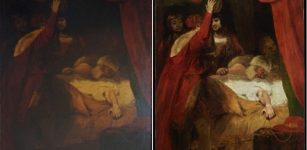 Previously Unseen Creature Emerges From Restored Joshua Reynolds Painting
Scripts, Paintings & Inscriptions | Nov 17, 2023
Previously Unseen Creature Emerges From Restored Joshua Reynolds Painting
Scripts, Paintings & Inscriptions | Nov 17, 2023 -
 Earliest Known Abecedary Engraved On Shard Of Pottery Dated To 15th Century BC – Deciphered
Archaeology | Oct 23, 2015
Earliest Known Abecedary Engraved On Shard Of Pottery Dated To 15th Century BC – Deciphered
Archaeology | Oct 23, 2015 -
 Genes And Languages: Development Of Pre-Incan Culture In Central Andes
News | Oct 26, 2020
Genes And Languages: Development Of Pre-Incan Culture In Central Andes
News | Oct 26, 2020 -
 Shakespeare ‘Borrowed’ Phrases From Little-Known Manuscript – Study Reveals
News | Mar 9, 2018
Shakespeare ‘Borrowed’ Phrases From Little-Known Manuscript – Study Reveals
News | Mar 9, 2018 -
 A 500-Year-Old Stolen Copy Of da Vinci’s “Salvator Mundi” Painting – Found By Italian Police
News | Jan 20, 2021
A 500-Year-Old Stolen Copy Of da Vinci’s “Salvator Mundi” Painting – Found By Italian Police
News | Jan 20, 2021 -
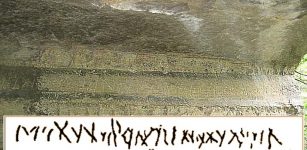 Mystery Of The Ancient Sitovo Inscription: Undeciphered Script Or Just A Natural Rock Formation?
Featured Stories | Apr 17, 2016
Mystery Of The Ancient Sitovo Inscription: Undeciphered Script Or Just A Natural Rock Formation?
Featured Stories | Apr 17, 2016 -
 Mysterious Orb In Leonardo Da Vinci’s Painting Salvator Mundi Investigated
Scripts, Paintings & Inscriptions | Jan 14, 2020
Mysterious Orb In Leonardo Da Vinci’s Painting Salvator Mundi Investigated
Scripts, Paintings & Inscriptions | Jan 14, 2020 -
 Gigantic Engravings Of A Giraffe Created Long Before Egypt As We Know It Existed
Civilizations | Jan 14, 2015
Gigantic Engravings Of A Giraffe Created Long Before Egypt As We Know It Existed
Civilizations | Jan 14, 2015 -
 Secrets Of The Bible: Codex Zacynthius – Hidden Text In New Testament May Soon Be Uncovered
Biblical Mysteries | Oct 7, 2014
Secrets Of The Bible: Codex Zacynthius – Hidden Text In New Testament May Soon Be Uncovered
Biblical Mysteries | Oct 7, 2014 -
 Art Historians Solve Mystery Of Raphael’s Tomb By Reconstructing His Face
Archaeology | Aug 7, 2020
Art Historians Solve Mystery Of Raphael’s Tomb By Reconstructing His Face
Archaeology | Aug 7, 2020 -
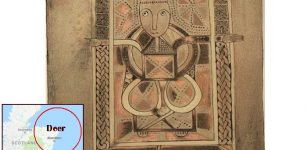 Book Of Deer And The Lost Scottish Monastery – Archaeologists Report New Finds
Archaeology | Jan 10, 2018
Book Of Deer And The Lost Scottish Monastery – Archaeologists Report New Finds
Archaeology | Jan 10, 2018 -
 Illuminated Ancient Manuscripts Reflect 1,000 Years Of Human History
Artifacts | Sep 12, 2015
Illuminated Ancient Manuscripts Reflect 1,000 Years Of Human History
Artifacts | Sep 12, 2015 -
 Riddle Of Two Undeciphered Elamite Scripts
Featured Stories | May 19, 2021
Riddle Of Two Undeciphered Elamite Scripts
Featured Stories | May 19, 2021 -
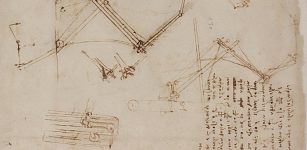 Leonardo da Vinci – A New Discovery On Folio 843 Of Codex Atlanticus
Scripts, Paintings & Inscriptions | Apr 18, 2023
Leonardo da Vinci – A New Discovery On Folio 843 Of Codex Atlanticus
Scripts, Paintings & Inscriptions | Apr 18, 2023 -
 Mawangdui Medical Manuscripts: Oldest Surviving Anatomical Atlas In The World
News | Sep 2, 2020
Mawangdui Medical Manuscripts: Oldest Surviving Anatomical Atlas In The World
News | Sep 2, 2020 -
 Hundreds Of Rock Paintings Found In Tanzania By Polish Archaeologist
Archaeology | Jul 11, 2018
Hundreds Of Rock Paintings Found In Tanzania By Polish Archaeologist
Archaeology | Jul 11, 2018 -
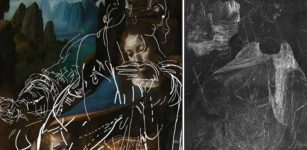 More Hidden Figures Beneath Leonardo Da Vinci’s Painting Virgin Of The Rocks – Discovered
Scripts, Paintings & Inscriptions | Feb 5, 2020
More Hidden Figures Beneath Leonardo Da Vinci’s Painting Virgin Of The Rocks – Discovered
Scripts, Paintings & Inscriptions | Feb 5, 2020


